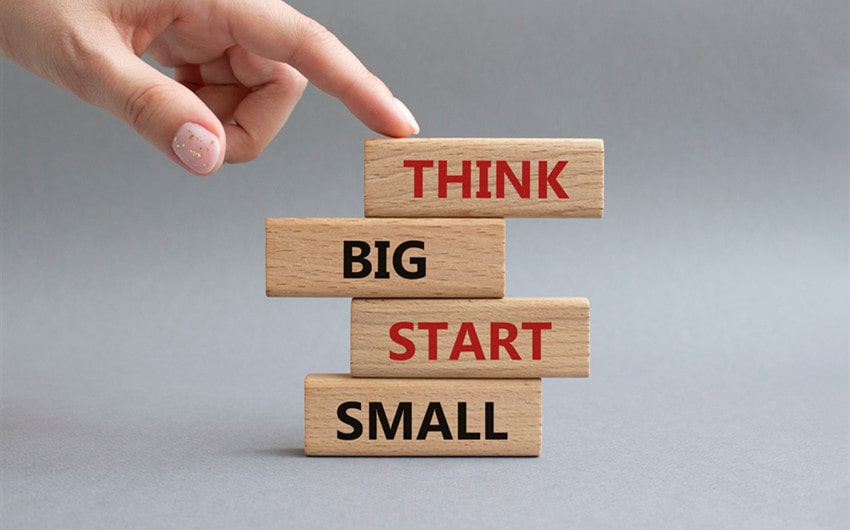The Power of Starting Small (and Sticking With It)
There’s something exciting about beginnings. We dream up big changes, picture our future selves, and feel that spark of motivation that makes everything seem possible. But then reality shows up—progress feels slow, results are invisible, and that spark fades. It’s easy to believe that if you can’t start big, it’s not worth starting at all.
Yet every meaningful change begins the same way—with one small step.
The older I get, the more I’ve come to believe that starting small isn’t weakness; it’s wisdom. It’s how real growth happens. It’s how we build habits that last, projects that matter, and lives that feel intentional.
Big dreams may inspire you, but small steps keep you moving.
The Myth of the Big Leap
We love dramatic transformations—the overnight success, the before-and-after story, the big leap that changes everything. But what those stories rarely show is the quiet, repetitive effort behind them.
No one builds a life overnight. The things that look effortless from the outside are often made up of a thousand tiny, unseen choices. Every musician once struggled through their first chord. Every writer once stared at a blank page. Every healthy person started with one better meal, one walk, one moment of commitment.
We underestimate the small because it feels ordinary, but the small is what shapes us. It’s where discipline grows. It’s where resilience takes root.
When you start small, you give yourself permission to be human—to begin imperfectly, to adjust, to build something real instead of chasing something instant.
Small steps may not look impressive, but they create momentum. And momentum, not motivation, is what carries you forward.
Why Starting Small Works
There’s a reason small beginnings are powerful: they’re sustainable.
When you start with something manageable, you reduce resistance. You don’t need to wait for perfect conditions, or the right time, or a burst of energy. You can start now.
Maybe it’s five minutes of writing, a ten-minute walk, or one drawer cleaned out. Small actions bypass the fear that comes with big change. They make growth approachable.
And here’s the thing—small steps compound. What feels insignificant today becomes progress tomorrow. You start to build trust with yourself. You start to believe that your effort matters, even when it’s quiet.
It’s not about how fast you move, but about how consistently you show up.
The world rewards intensity, but life rewards consistency.
Letting Go of Perfection
One of the biggest obstacles to starting small is perfectionism. We think if it’s not all or nothing, it’s nothing at all.
But perfectionism keeps you frozen in preparation. It convinces you that you’re not ready yet, that the idea needs more planning, or that the conditions have to be just right.
The truth is, you’ll never feel fully ready—and you don’t have to be. You only have to start.
Small steps allow you to learn while doing. You gather feedback, build skill, and gain confidence. You stop waiting to be perfect and start practicing being present.
Perfection asks for flawless results; progress asks for your effort.
Every time you take a small step, you choose courage over comfort. And that choice compounds faster than you think.
The Momentum of Consistency
Consistency is what turns a small start into a meaningful result.
Think about a plant—you don’t water it once and expect it to bloom overnight. You show up daily, trusting that the small care you give will eventually grow into something beautiful.
The same is true for your goals.
Consistency creates stability. It’s the quiet, repetitive rhythm that builds trust between your intentions and your actions. You don’t need massive effort every day; you need honest effort, repeated often.
And when you miss a day—which you will—it’s not failure. It’s a reminder to return. Small doesn’t mean fragile; it means forgiving.
When you stick with something long enough, you begin to notice change in subtle ways. A little more energy. A little more confidence. A little more peace. Progress reveals itself slowly, but once it does, it’s undeniable.
The Hidden Strength in Patience
Starting small teaches patience, and patience is one of life’s most underrated strengths.
In a world obsessed with quick results, patience feels like an inconvenience. But patience is actually what allows results to last. It keeps you grounded when progress feels invisible.
Every small effort adds up, even when you can’t see it yet. Just because change isn’t immediate doesn’t mean it isn’t happening.
There’s power in staying consistent long enough for growth to catch up with your effort.
When you start small, you learn to trust time. You stop measuring progress by instant gratification and start valuing quiet persistence.
You realize that the process isn’t something to rush through—it’s the very thing shaping you into the person you’re trying to become.
Building Trust With Yourself
Every small promise you keep builds self-trust. It’s proof to your mind that you can depend on your own word.
If you say you’ll go for a short walk and you do, your brain learns that your intentions matter. If you say you’ll write one paragraph a day and stick with it, you begin to see yourself as reliable.
Self-trust doesn’t come from grand declarations—it comes from follow-through.
And once you trust yourself, bigger changes feel possible. Because you know you can count on you.
That’s what makes starting small so powerful—it’s not just about achieving a goal, it’s about transforming your relationship with yourself. You begin to see that progress isn’t something outside of you; it’s something you create, one action at a time.
The Ripple Effect of Small Efforts
Small actions don’t stay small for long. They create ripples that move into other parts of your life.
Maybe your ten-minute walks lead to more energy and clearer thinking. Maybe writing one page a day turns into a book. Maybe saving a small amount of money each week builds confidence in your financial future.
Small shifts have a way of building momentum that surprises you. One habit supports another, one change opens the door for the next.
Starting small teaches you that progress doesn’t require drama—it requires devotion.
It’s a quiet kind of power, the kind that builds slowly but lasts much longer than a burst of motivation ever could.
When You Feel Like It’s Not Enough
There will be moments when your small steps feel pointless. You’ll wonder if you’re really getting anywhere. But those are the moments that matter most, because they’re the ones where persistence begins to take root.
When you show up anyway—when you keep doing the work even when it’s invisible—you’re strengthening the part of you that refuses to give up.
Small steps may not give you instant results, but they give you resilience. They teach you how to keep going, how to stay steady, and how to trust the process even when it feels slow.
Growth often hides in repetition. You might not see the transformation day by day, but it’s happening in the background, quietly reshaping who you are.
The Power of Commitment
Starting small is the beginning, but sticking with it is the secret.
Commitment doesn’t mean perfection. It means returning—again and again—to what matters. It means forgiving yourself when you fall off track and choosing to begin again.
Every time you recommit, you strengthen your foundation. You remind yourself that discipline doesn’t come from force—it comes from love. Love for your future self, love for your potential, love for the quiet process of becoming.
When you stick with small habits long enough, they stop being something you do and start becoming who you are.
Closing Thoughts
The power of starting small isn’t just about achieving goals—it’s about transformation. It’s how we learn to trust ourselves, to be patient with growth, and to find meaning in the process instead of rushing to the outcome.
The truth is, big change is just small change that never stopped.
You don’t need to wait for the perfect moment. You don’t need to know exactly how it’ll turn out. You just need to begin—and keep beginning until it becomes natural.
Start where you are. Start with what you have. Start small, but start.
Because the smallest step forward still moves you closer to the life you want to live.





